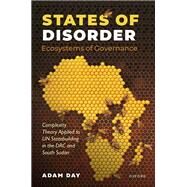States of Disorder, Ecosystems of Governance Complexity Theory Applied to UN Statebuilding in the DRC and South Sudan
, by Day, Adam- ISBN: 9780192863898 | 0192863894
- Cover: Hardcover
- Copyright: 10/31/2022
Today's vision of world order is founded upon the concept of strong, well-functioning states, in contrast to the destabilizing potential of failed or fragile states. This worldview has dominated international interventions over the past 30 years as enormous resources have been devoted to developing and extending the governance capacity of weak or failing states, hoping to transform them into reliable nodes in the global order. But with very few exceptions, this project has not delivered on its promise: countries like Somalia, Afghanistan, South Sudan, and the Democratic Republic of the Congo (DRC) remain mired in conflict despite decades of international interventions.
States of Disorder addresses the question, 'Why has UN state-building so consistently failed to meet its objectives?'. It proposes an explanation based on the application of complexity theory to UN interventions in South Sudan and DRC, where the UN has been tasked to implement massive stabilization and state-building missions. Far from being ''ungoverned spaces," these settings present complex, dynamical systems of governance with emergent properties that allow them to adapt and resist attempts to change them. UN interventions, based upon assumptions that gradual increases in institutional capacity will lead to improved governance, fail to reflect how change occurs in these systems and may in fact contribute to underlying patterns of exclusion and violence. Based on more than a decade of the author's work in peacekeeping, this book offers a systemic mapping of how governance systems work, and indeed work against, UN interventions. Pursuing a complexity-driven approach instead helps to avoid unintentional consequences, identifies meaningful points of leverage, and opens the possibility of transforming societies from within.
States of Disorder addresses the question, 'Why has UN state-building so consistently failed to meet its objectives?'. It proposes an explanation based on the application of complexity theory to UN interventions in South Sudan and DRC, where the UN has been tasked to implement massive stabilization and state-building missions. Far from being ''ungoverned spaces," these settings present complex, dynamical systems of governance with emergent properties that allow them to adapt and resist attempts to change them. UN interventions, based upon assumptions that gradual increases in institutional capacity will lead to improved governance, fail to reflect how change occurs in these systems and may in fact contribute to underlying patterns of exclusion and violence. Based on more than a decade of the author's work in peacekeeping, this book offers a systemic mapping of how governance systems work, and indeed work against, UN interventions. Pursuing a complexity-driven approach instead helps to avoid unintentional consequences, identifies meaningful points of leverage, and opens the possibility of transforming societies from within.






